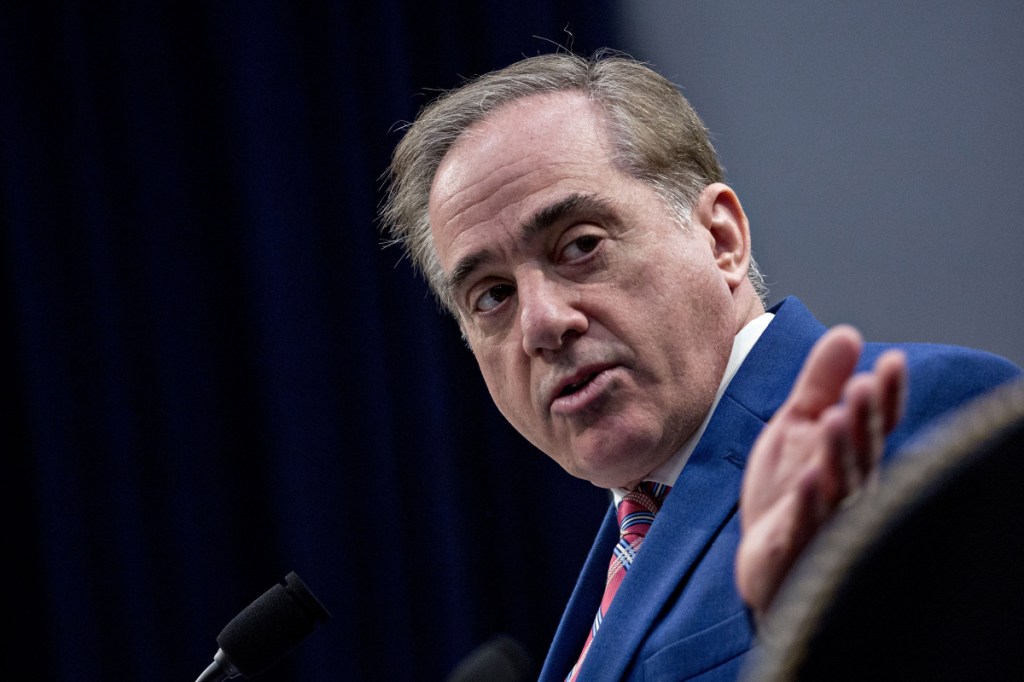WASHINGTON — President Trump ousted Veterans Affairs Secretary David Shulkin on Wednesday after turmoil in the agency’s senior ranks generated weeks of unflattering headlines, ushering in a potentially dramatic shift to veterans policy.
The president announced that he would nominate Rear Adm. Ronny Jackson, his personal physician, to replace Shulkin, a physician and former hospital executive who was the sole Obama-era holdover in Trump’s Cabinet. Robert Wilke, who serves as an undersecretary at the Defense Department, will serve as acting secretary.
Shulkin’s ouster comes amid a broader shake-up that began with Trump’s firing of Secretary of State Rex Tillerson on March 13. The president also has decided to replace his national security adviser, Lt. Gen. H.R. McMaster, with former U.N. ambassador John Bolton.
Shulkin’s firing had been expected for weeks as the president, who once considered him a favorite grew disenchanted with him after a travel scandal and months of infighting within the senior ranks at the Department of Veterans Affairs spilled into public view.
Shulkin, 58, went public with claims that Trump appointees on his staff were conspiring to have him removed. The power struggle centered on differences over a shift to offering veterans more medical care from private doctors at taxpayers’ expense, with conservatives at VA and in the White House pushing for more private care and Shulkin favoring a more moderate approach.
The next VA secretary is likely to favor a shift toward more private care, a goal at odds with many of the traditional veterans advocacy groups.
Shulkin did not serve in the military, but he enjoyed broad support from traditional veterans groups, which fear that more private sector care will lead to diminished resources for VA’s 1,700 medical clinics and hospitals.
VA, the second-largest federal bureaucracy, employs 360,000 people and accounts for $186 billion annually. Its sprawling health-care and benefits system, which Trump blasted on the campaign trail as a wasteful, inefficient failure, serves 9 million former troops.
An internist who came to government with 30 years’ experience leading private hospitals, Shulkin led the Veterans Health Administration for 18 months under former president Barack Obama.
He delivered multiple legislative victories for Trump during his first year at the agency, from a bill that clears a fast path to firing employees accused of misconduct to measures aimed at easing the backlog of benefit appeals. He oversaw creation of a 24-hour hotline for veteran complaints and improved transparency, posting wait times for medical appointments at each facility and other quality-control measures consistent with many private sector hospitals.
“He also deserves some credit for holding the ship together during these very turbulent first 15 months of the Trump administration, just keeping the VA moving forward,” said Philip Carter, a senior fellow at the Center for a New American Security, where he focuses on veterans issues.
Shulkin’s biggest weakness Carter said, was that he didn’t connect with the president’s allies. “That was always festering beneath the surface – he was an Obama holdover,” Carter said. “And stylistically he’s not of the same world as President Trump. He never quite clicked with the president’s inner circle.”
Though Trump and Shulkin got along well for many months, the mood inside the White House began to change as Shulkin clashed with conservative appointees over how to expand veterans access to private medical care, a program known as Choice that started in 2014 after revelations VA managers were manipulating patient wait lists.
They believed Shulkin was not moving aggressively enough to expand private care, and worked behind the scenes to sow doubt in the minds of the president and his top aides after VA’s inspector general released a critical investigation in February into a trip the secretary led to Europe last summer.
The report found “serious derelictions” before and during the trip, much of which was spent sightseeing. It found that Shulkin improperly accepted a gift of Wimbledon tennis tickets for him and his wife, who traveled with him at taxpayer expense.
Shulkin vociferously defended himself at first, insisting he did nothing wrong and accusing his detractors at VA of using the report to force him out. It led to embarrassing headlines that irritated top White House officials and the president, who began to search for a replacement.
The VA secretary oversees a health care and benefits system beset by challenges, including an alarming suicide rate of 20 veterans per day, and a shortage of mental health therapists, doctors and nurses.
Send questions/comments to the editors.




Comments are no longer available on this story